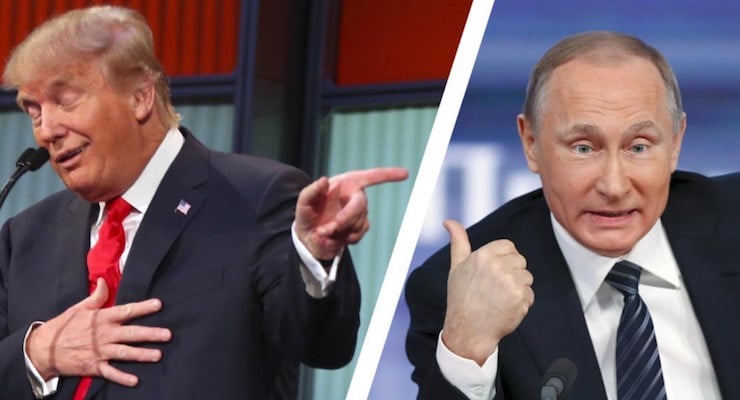

New York businessman Donald J. Trump, left, and Vladimir Putin. (Photo: Andrew Harnik/AP; Reuters)
When Donald Trump talks dealmaking, he is talking about the use of strategy, negotiating positions and unpredictability to secure one’s best interests and agenda. When President Barack Obama and his aides talk diplomacy, they mean appeasement, predictability and giving the other side everything it wants, so that maybe — just maybe — your adversary will give you something you want in return. Mr. Obama’s Iran “deal” is the latest product of that misguided approach.
I think Vladimir Putin read Mr. Trump’s book.
If the Russian president is anything, he is unpredictable. Mr. Putin has used this playbook in Crimea, eastern Ukraine and now in the Middle East. He has continually been three steps ahead of the White House, surprising it again and again, all the while pushing back American and Western influence around the globe.
Mr. Putin is a master at escalation and de-escalation, pushing the West as far as he can until he gets serious resistance, then retreating and regrouping before going for a bigger slice of the pie, when the U.S. and its allies are no longer focused on the problem.
Russia is preparing for the worst and taking what it can get. Even the U.S. military is becoming concerned with the rapid advances in military capability that the Kremlin is buying with years of increased spending on weapons and a focus on modernization.
The question is, what are the Kremlin’s intentions? How will the Russians use all of this newly created power-projection capability? I would suggest we will see more of what we’ve seen in the recent past, just in unexpected ways and places. Moscow will continue to take back old Soviet territory and influence where it can. These advances will happen in lightning-fast, unpredictable ways, as was the case with Crimea and the Russian landing in Syria. For Mr. Putin, diplomacy doesn’t mean telegraphing Russian intentions so the West can counteract them; it is instead a tool to be used, along with military force, to foster Russia’s interests and agenda. As Clausewitz so famously said, “War is merely the continuation of politics by other means.”
This is a mindset and a strategy that Mr. Trump has suggested he will follow whenever the Republican presidential front-runner is questioned on his national security and foreign policy positions. When asked about waterboarding, Mr. Trump vows to “do much worse,” with a lack of specifics that will keep the terrorists guessing. On NATO, Mr. Trump has said the alliance is obsolete and needs to be revamped, putting free-riding European nations on notice that they will have to pony up for a larger share of their own defense.
Mr. Trump talks of building up the U.S. military so that “no one will mess with us.” This is the opening salvo in an aggressive Trumpian effort to rebuild American power and influence, which has been decimated under the Obama administration. Mr. Trump says he will use this power to ensure security for all Americans and our allies, but not to take territory and become embroiled in conflicts overseas.
Newly commissioned officers in the U.S. military are taught, when training a new command, to start out as a hard and unforgiving taskmaster, someone the troops will respect and fear, someone who is tough but has his unit’s best interests at heart. After you establish this baseline, you can back off.
That, in my humble opinions, is precisely what Mr. Trump is doing — brilliantly, I might add. He is establishing a tough baseline position to begin the process of re-establishing American credibility and respect, honoring Machiavelli’s dictum that “it is better to be feared than loved.” He does not want to destroy NATO but does want to remake it more in line with American interests. He does not want South Korea and Japan to acquire nuclear weapons, but wants them to pay more for their own security.
Mr. Trump will use unpredictability and extreme opening negotiating positions to remake the geopolitical landscape. He intends to reduce America’s financial obligations around the world because we simply can no longer afford it. In the long run, this will enhance America’s security and the security of our allies.
As for Mr. Putin, he is already making Russia great again.
(H/T: This article originally appeared on Behind the Curtain via The Washington Times)
[mybooktable book=”currency” display=”summary” buybutton_shadowbox=”true”]





